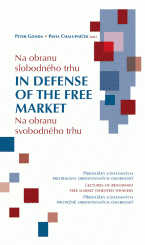 |
|||||||
| INSTITUTE | CONSERVATISM | M.R.STEFANIK |
| CONSERVATIVE LETTERS
|
[03.09.2012, Alejandro A. Chafuen, CONSERVATIVE LETTERS]
In the early 1990’s two free market oriented think tanks began an effort to measure economic freedom. The Heritage Foundation, today the largest market oriented think tank in the world, wanted its index to serve as a guide for the United States foreign aid program. The Fraser Institute, in Canada, that has earned a stellar reputation specializing in measurements, was leading an academic discussion about the possibility of creating and index of economic liberty. The Liberty Fund, a US foundation, was the main sponsor of these discussions. A third group, Freedom House, was measuring “Freedom.” Its index, however, neglected economic freedom. They also decided to create an index of economic freedom. The three indices were released almost at the same time. Despite their methodological differences, they all showed a strong similarity. For the first time in the history of economics, we had three efforts to measure economic freedom around the world. These measurements appeared at a time when the leaders of many countries where embarking on market oriented reforms. After the collapse of the old Soviet Empire, countries in their former orbit began to open their economies, liberate most prices and to privatize state-owned companies. In Latin America, economic policies were shifting away from the protectionism of import-substitution models, and also following a path of market oriented reforms. Noted economists, like the late Nobel Laureate Milton Friedman, were asked about what were the best reform policies for countries which were coming out from communism and totalitarianism. Milton Friedman answered, “we need three things, privatization, privatization, privatization.” As in many countries the privatization was not transparent, very soon the critics of economic liberalism begun to blame economic freedom for an increase in corruption. During the latter part of his life, when Friedman was asked the same question, he changed the answer, he called for “rule of law, rule of law, rule of law.” Almost at the same time of the release of the first economic freedom index, Transparency International released its first comprehensive index of perception of corruption. This created the possibility to test the premise that economic liberalization was the culprit for corruption. I teamed up with a young Chilean social scientist, Eugenio Guzmán, a graduate of the London School of Economics, who was a fellow at the Atlas Economic Research Foundation, and we developed the first ever study on corruption and economic freedom. The empirical study showed that unlike what the critics of markets were saying, the more economic freedom the least corruption. The results were very strong but, as usual, there were some exceptions. My native country, Argentina, was one of these. The government focused on privatizations, on lowering tariffs, on liberalizing the exchange rate, and other economic reforms. It neglected however efforts to improve the independence and efficiency of the judiciary, and other areas relevant for establishing a legal framework conducive to a just free-enterprise system. Some privatizations were simple transfers of state owned companies to friends of the government. Despite a lowering of import taxes to 10%, a group with privileged access to the government was allowed to bring all their containers tax free, not only avoiding import duties, but other taxes as well. As long as government exists and needs to spend money, even in countries moving to free markets, there is chance of having corrupt government procurement contracts. Requests for bids were written in such way that it was likely that only one company, the one with the right contacts in the government, would win the bid. In most countries, usually for reasons of national security, there are areas of procurement which allow for government discretion. But in the most corrupt countries, what should be the exception became the rule. During the early days of market oriented reforms, the extended petty corruption that existed across economies with price controls, differential exchange rates, interest rate controls, and arbitrary subsidies, was replaced by more focused acts of corruption. This in many cases increased the perception of corruption, and focused on a less “democratic” type of bribery. It was only those in power who were seen as benefitting. Presidents of the three largest Latin American countries (Mexico, Brazil, and Argentina) left power under a cloud of suspicion. The Corruption Perception Index, compiled by Transparency International, show Slovakia scoring 4, just ahead of Brazil, Mexico and Argentina. Central Europe is not Latin America and each country is a special case. Impunity for corruption conducted by government friends is more prevalent in the latter. Voters seem to act in a more principled way in the former. The worse case has been Argentina, where rather than combating corruption, the government combated economic freedom. Venezuela is also on that road. The result has been increased corruption. Slovakia should not follow that path. Alejandro A. Chafuen is a President of The Atlas Economic Research Foundation (USA). Alejandro A. Chafuen will be our guest and present his lecture at the Conservative Economic Quarterly Lecture Series (CEQLS) held by the Conservative Institute of M. R. ©tefánik in Bratislava on September 17, 2012. More information is available here. Article was published in Slovak language in Conservative Letters 07-08/2012, a newsletter of the Conservative Institute. |
 English | Slovak
English | Slovak
This website was created also thanks to funding granted by The Trust
for Civil Society in Central and Eastern Europe.
Website powered by Metafox CMS from Platon Group.
|
Conservative Institute of M. R. Stefanik |
Tel.:
+421 258 100 188 |







